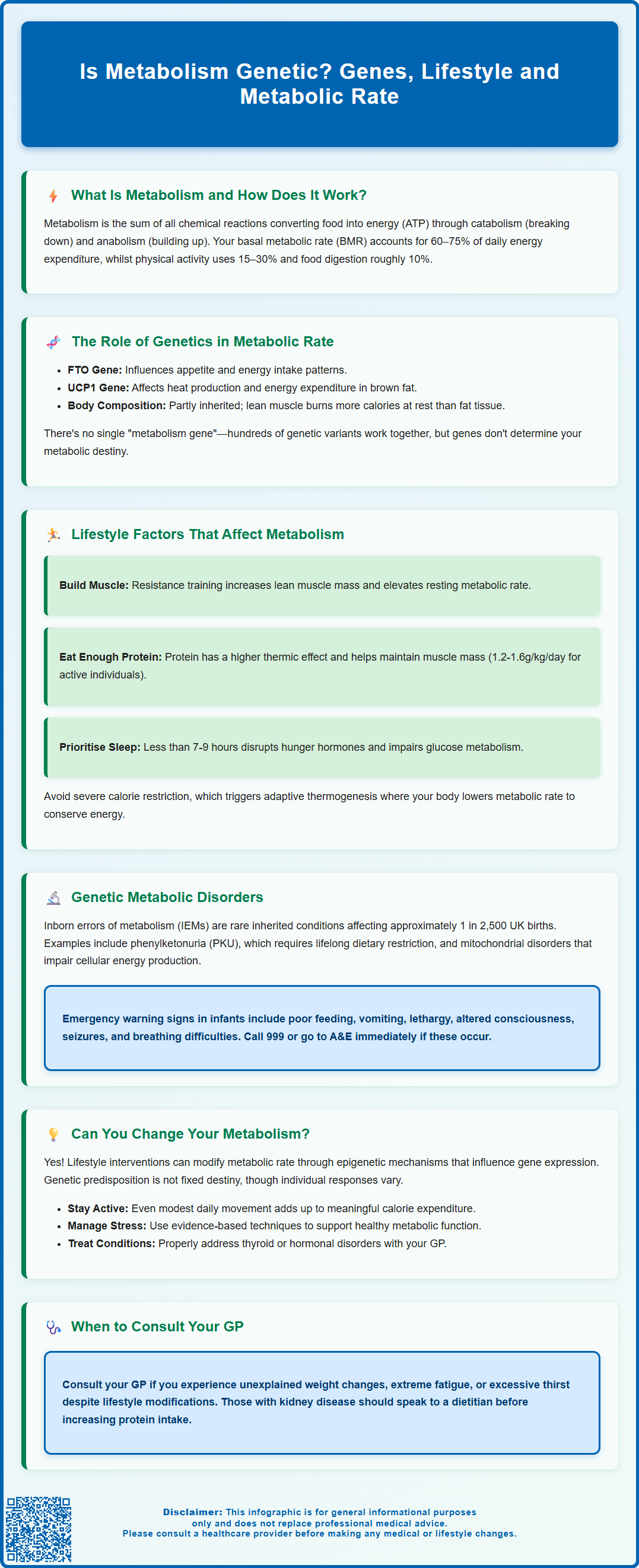Is metabolism genetic? This question concerns many seeking to understand why metabolic rates vary between individuals. Metabolism encompasses all biochemical processes converting food into energy, regulated by complex hormonal and enzymatic pathways. Whilst genetics undoubtedly influences your basal metabolic rate—with twin studies suggesting substantial heritability—environmental factors exert considerable modifying effects. Your genetic blueprint establishes a metabolic baseline, but lifestyle interventions including physical activity, dietary patterns, sleep quality, and stress management can meaningfully alter metabolic function. Understanding this gene-environment interplay empowers evidence-based approaches to optimising metabolic health, regardless of inherited tendencies. This article examines the scientific evidence surrounding genetic and modifiable influences on metabolism.
Summary: Metabolism is partly genetic, with genes contributing substantially to individual variation in basal metabolic rate, but environmental factors including physical activity, diet, sleep, and stress management exert considerable modifying effects on metabolic function.
- Genetic factors contribute significantly to basal metabolic rate variation, though no single 'metabolism gene' exists—hundreds of variants collectively influence metabolic phenotype.
- Genes affecting metabolism include FTO (appetite regulation), UCP1 (thermogenesis in brown adipose tissue), and thyroid-related genes influencing hormonal regulation.
- Resistance training increases lean muscle mass and elevates resting metabolic rate, as muscle tissue is metabolically more active than adipose tissue.
- Inborn errors of metabolism are rare inherited conditions caused by enzyme deficiencies, collectively affecting approximately 1 in 2,500 UK live births and requiring specialist management.
- Lifestyle interventions can modify gene expression through epigenetic mechanisms, meaning genetic predisposition does not determine metabolic destiny.
- Unexplained weight changes, extreme fatigue, or metabolic symptoms warrant GP consultation for investigation of conditions such as hypothyroidism or diabetes.
Table of Contents
What Is Metabolism and How Does It Work?
Metabolism refers to the sum of all chemical reactions occurring within the body's cells to maintain life. These biochemical processes convert nutrients from food into energy (adenosine triphosphate, or ATP) that powers everything from breathing and circulation to cellular repair and growth. Metabolism comprises two main phases: catabolism, which breaks down molecules to release energy, and anabolism, which uses energy to construct cellular components such as proteins and nucleic acids.
Your basal metabolic rate (BMR) represents the energy expended at rest to maintain vital functions—typically accounting for approximately 60–75% of total daily energy expenditure in most adults, though this varies by individual. Physical activity (including both structured exercise and non-exercise activity thermogenesis) contributes around 15–30%, whilst the thermic effect of food (energy used to digest, absorb, and process nutrients) accounts for roughly 10%.
Metabolic processes are regulated by complex hormonal and enzymatic pathways. The thyroid gland produces hormones (thyroxine and triiodothyronine) that significantly influence metabolic rate, whilst insulin regulates glucose metabolism. Mitochondria—often termed the cell's 'powerhouses'—are central to energy production through oxidative phosphorylation. Understanding metabolism is essential because disruptions to these finely balanced processes can contribute to conditions ranging from obesity and type 2 diabetes to rare inherited metabolic disorders. The interplay between genetic programming and environmental factors determines how efficiently your body converts food into energy and maintains metabolic homeostasis.
The Role of Genetics in Metabolic Rate
Genetics undoubtedly plays a substantial role in determining individual metabolic rate, though the extent remains an area of active research. Twin and family studies suggest that genetic factors contribute significantly to variation in basal metabolic rate between individuals, with heritability estimates varying across studies. However, this does not mean metabolism is entirely predetermined—rather, genes establish a baseline tendency that interacts with environmental influences.
Several genes influence metabolic rate through different mechanisms. The FTO gene (fat mass and obesity-associated gene) has been associated primarily with energy intake and appetite regulation, with more limited evidence for direct effects on energy expenditure. Genes encoding uncoupling proteins (UCPs), particularly UCP1 found in brown adipose tissue, affect thermogenesis—the production of heat through energy expenditure. Some research suggests variations in thyroid-related genes may influence how efficiently thyroid hormones regulate metabolism, though evidence strength varies.
Body composition, which is partly genetically determined, significantly affects metabolic rate. Lean muscle tissue is metabolically more active than adipose (fat) tissue, burning more calories at rest. Individuals who inherit a tendency towards greater muscle mass may therefore have naturally higher metabolic rates. Similarly, genetic influences on height and frame size affect total energy requirements.
It is important to note that whilst genetics establishes a framework, there is no single 'metabolism gene'. Rather, hundreds of genetic variants collectively contribute small effects that, combined with lifestyle factors, determine your metabolic phenotype. Genetic predisposition does not equate to metabolic destiny—environmental factors remain powerful modulators of how genes are expressed and function.

Environmental and Lifestyle Factors Affecting Metabolism
Whilst genetics provides the blueprint, environmental and lifestyle factors exert considerable influence over metabolic rate and can either amplify or mitigate genetic tendencies. Physical activity is perhaps the most modifiable factor: regular exercise, particularly resistance training, increases lean muscle mass and thereby elevates resting metabolic rate. High-intensity interval training (HIIT) can produce a modest 'afterburn effect' (excess post-exercise oxygen consumption), temporarily increasing metabolism for a short period following activity, though the total energy impact is relatively small.
Dietary patterns significantly impact metabolic function. Severe caloric restriction can trigger adaptive thermogenesis—a protective mechanism where the body reduces metabolic rate to conserve energy, sometimes persisting even after normal eating resumes. Protein intake supports muscle maintenance and has a higher thermic effect than carbohydrates or fats, meaning more energy is expended during digestion. The timing and frequency of meals may have modest effects, though evidence remains mixed regarding claims about 'boosting metabolism' through specific eating patterns.
Sleep quality and duration influence metabolic hormones profoundly. Sleep deprivation disrupts leptin and ghrelin (hormones regulating hunger and satiety), increases cortisol levels, and impairs glucose metabolism—potentially affecting metabolic function. The NHS recommends adults aim for 7–9 hours of quality sleep nightly.
Chronic stress elevates cortisol, which can promote central adiposity and insulin resistance. Recent research suggests that energy expenditure remains relatively stable from early adulthood until around age 60, after which it begins to decline—contrary to the traditional view of steady decline from age 30. This age-related change is partly due to muscle loss, which can be substantially mitigated through resistance exercise. Certain medications, including some antidepressants and corticosteroids, can also affect metabolic rate—never stop or change prescribed medications without consulting your GP or specialist. These modifiable factors demonstrate that lifestyle interventions can meaningfully influence metabolism regardless of genetic background.
Genetic Metabolic Disorders and Inherited Conditions
Genetic metabolic disorders, also termed inborn errors of metabolism (IEMs), are a group of rare inherited conditions caused by mutations in genes encoding enzymes or transport proteins essential for metabolic pathways. These disorders typically follow Mendelian inheritance patterns (autosomal recessive, autosomal dominant, or X-linked), though mitochondrial disorders may follow maternal inheritance patterns. IEMs can affect the metabolism of amino acids, carbohydrates, lipids, or complex molecules. Whilst individually rare, collectively they affect approximately 1 in 2,500 live births in the UK according to screening data.
Phenylketonuria (PKU) is amongst the most well-known IEMs, caused by deficiency of the enzyme phenylalanine hydroxylase. Without dietary management (restricting phenylalanine intake), toxic metabolites accumulate, causing intellectual disability. The UK Newborn Blood Spot Screening Programme tests for PKU and several other metabolic disorders, enabling early intervention. Glycogen storage diseases result from defects in enzymes regulating glycogen synthesis or breakdown, leading to abnormal glycogen accumulation in tissues—presenting with hypoglycaemia, hepatomegaly, or muscle weakness depending on the specific subtype.
Mitochondrial disorders arise from mutations affecting oxidative phosphorylation, impairing cellular energy production. These conditions often present with multi-system involvement, particularly affecting high-energy-demand tissues (brain, heart, skeletal muscle). Symptoms vary widely but may include developmental delay, seizures, cardiomyopathy, and exercise intolerance.
Urgent warning signs that may indicate an acute metabolic crisis, particularly in infants, include poor feeding, vomiting, lethargy, altered consciousness, seizures, and breathing difficulties. These require immediate medical attention via 999 or A&E.
Diagnosis typically involves biochemical testing (plasma amino acids, urine organic acids, acylcarnitine profiles), genetic testing, and sometimes enzyme assays or tissue biopsy. Management is highly specialised, often coordinated through regional inherited metabolic disease centres within the NHS. Treatment strategies may include:
-
Dietary modification (substrate restriction or supplementation)
-
Cofactor supplementation (vitamins that enhance residual enzyme activity)
-
Enzyme replacement therapy for selected conditions
-
Emergency protocols to prevent metabolic decompensation during illness
If you have a family history of metabolic disorders or concerns about unexplained symptoms, discuss genetic counselling with your GP, who can arrange appropriate specialist referral to your regional inherited metabolic disease service or clinical genetics department.
Can You Change Your Metabolism Despite Your Genes?
The encouraging answer is yes—whilst genetics establishes your metabolic baseline, lifestyle interventions can meaningfully modify metabolic rate and efficiency. Research demonstrates that environmental factors can influence gene expression through epigenetic mechanisms, effectively 'switching on or off' certain genetic programmes without altering the underlying DNA sequence. This means genetic predisposition is not an immutable sentence, though the magnitude of change varies between individuals.
Resistance training is particularly effective for increasing metabolic rate. Building lean muscle mass elevates resting energy expenditure because muscle tissue requires more energy for maintenance than adipose tissue. NICE guidance on obesity management emphasises that physical activity should be part of a multicomponent approach alongside dietary changes and behavioural support. Even modest increases in daily movement—taking stairs, walking during breaks—accumulate meaningful energy expenditure over time.
Dietary strategies can optimise metabolic function within your genetic framework. The UK Reference Nutrient Intake (RNI) for protein is approximately 0.75g per kilogram of body weight daily for most adults. Higher protein intakes (up to 1.2–1.6g/kg/day) may benefit physically active individuals, though you should seek advice from a registered dietitian if considering significant increases, particularly if you have kidney disease. Avoiding extreme caloric restriction prevents adaptive metabolic slowdown. Following the NHS Eatwell Guide provides a balanced approach to nutrition that supports metabolic health.
Addressing modifiable risk factors is crucial: prioritising sleep hygiene, managing chronic stress through evidence-based techniques (cognitive behavioural therapy, mindfulness), and avoiding smoking all support optimal metabolic function. For individuals with thyroid disorders or other hormonal imbalances affecting metabolism, appropriate medical management can restore more normal metabolic rates. Never stop prescribed medications without consulting your doctor, and report suspected side effects via the MHRA Yellow Card scheme (yellowcard.mhra.gov.uk).
Maintain realistic expectations—claims about foods or supplements that dramatically 'boost metabolism' are generally exaggerated. Sustainable lifestyle changes produce modest but meaningful effects. If you experience unexplained weight changes, extreme fatigue, excessive thirst, or other concerning symptoms despite lifestyle modifications, consult your GP. They may investigate with blood tests (thyroid function, glucose levels, full blood count) to exclude conditions such as hypothyroidism, diabetes, or polycystic ovary syndrome. Genetic predisposition influences but does not determine metabolic destiny—consistent, evidence-based lifestyle interventions remain powerful tools for optimising metabolic health regardless of your genetic inheritance.
Frequently Asked Questions
Can you inherit a slow metabolism from your parents?
Yes, genetic factors contribute substantially to basal metabolic rate, with twin and family studies demonstrating heritability. However, hundreds of genetic variants collectively influence metabolism rather than a single gene, and lifestyle factors including physical activity, diet, and sleep can meaningfully modify metabolic rate regardless of genetic inheritance.
What genetic conditions affect metabolism?
Inborn errors of metabolism (IEMs) are rare inherited conditions caused by enzyme deficiencies affecting metabolic pathways. Examples include phenylketonuria (PKU), glycogen storage diseases, and mitochondrial disorders. The UK Newborn Blood Spot Screening Programme tests for several metabolic disorders, enabling early intervention and specialist management through regional inherited metabolic disease centres.
Can lifestyle changes overcome genetic metabolic tendencies?
Yes, lifestyle interventions can meaningfully modify metabolic rate despite genetic predisposition. Resistance training increases lean muscle mass and resting energy expenditure, adequate protein intake supports muscle maintenance, quality sleep regulates metabolic hormones, and stress management improves metabolic function. These evidence-based strategies work through epigenetic mechanisms that influence gene expression without altering underlying DNA.
The health-related content published on this site is based on credible scientific sources and is periodically reviewed to ensure accuracy and relevance. Although we aim to reflect the most current medical knowledge, the material is meant for general education and awareness only.
The information on this site is not a substitute for professional medical advice. For any health concerns, please speak with a qualified medical professional. By using this information, you acknowledge responsibility for any decisions made and understand we are not liable for any consequences that may result.
Heading 1
Heading 2
Heading 3
Heading 4
Heading 5
Heading 6
Lorem ipsum dolor sit amet, consectetur adipiscing elit, sed do eiusmod tempor incididunt ut labore et dolore magna aliqua. Ut enim ad minim veniam, quis nostrud exercitation ullamco laboris nisi ut aliquip ex ea commodo consequat. Duis aute irure dolor in reprehenderit in voluptate velit esse cillum dolore eu fugiat nulla pariatur.
Block quote
Ordered list
- Item 1
- Item 2
- Item 3
Unordered list
- Item A
- Item B
- Item C
Bold text
Emphasis
Superscript
Subscript












